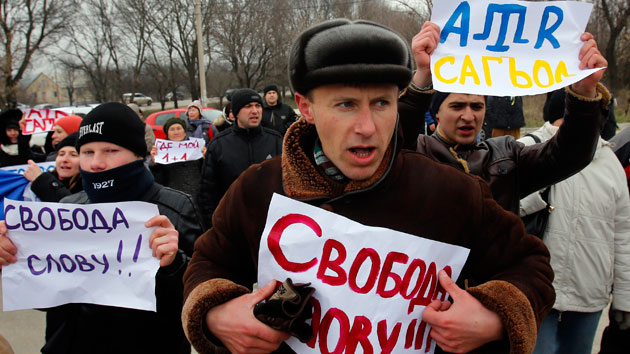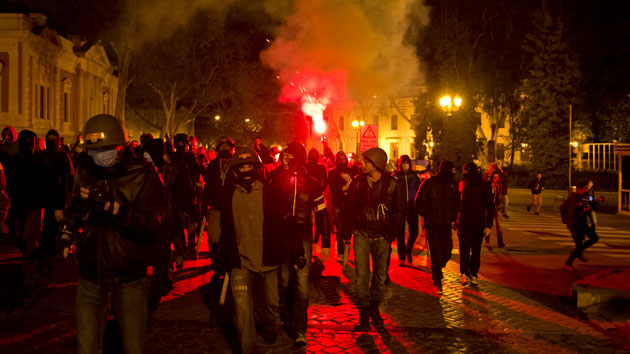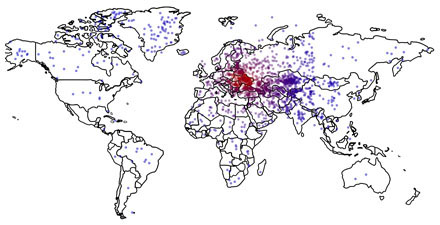
Crimean Tatars call for freedom of speech during a protest in Crimea in March. Darko Vojinovic/AP
Human rights violations, including killings, beatings, harassment of minorities, and abductions of journalists and activists, are escalating in Ukraine, according to a report released this weekend by the Office of the United Nations High Commissioner for Human Rights. The growing tension, the report says, is fueled primarily by the DIY armed groups and self defense units that have sprung up around the country.
The expansive report is based on information gathered by the UN’s Human Rights Monitoring Mission in Ukraine (HRMMU), and concludes that “the continuation of the rhetoric of hatred and propaganda fuels the escalation of the crisis in Ukraine, with a potential of spiraling out of control.” The Russian Foreign Ministry criticized the UN’s report for a “complete lack of objectivity, glaring disparities and double standards.”
We’ve gone through the full report and pulled out some of its noteworthy findings:
Deaths and injuries:
- Following violent clashes in early December, January, and mid-February, more than 120 activists were killed and hundreds injured.
- During clashes in Odessa earlier this month that led to a fire in the city’s trade union building, 46 people were killed and 230 injured.
- In the initial aftermath of this winter’s Maidan protests, 314 people were registered as missing. Most have since been found alive, but some were found dead while the fate of some others is still unknown.
Discrimination against minority groups: The UN’s special rapporteur on minority issues visited Ukraine in April. On the issue of minority treatment, she warned that “in some localities the level of tension had reached dangerous levels.” Namely:
- There have been ongoing reports of hate crimes, threats, and harassment against LGBT people by both pro-Russian and pro-Ukrainian forces. Several Ukrainian political parties, including the right-wing Svoboda and Right Sector, state that combating homosexuality is one of their goals. Meanwhile, though, Ukraine’s version of a ban on “gay propaganda” was withdrawn from parliament consideration in mid-April, though another law that would have similar effects is still under consideration. (The bill, draft law 0945, would prohibit the production of media, TV, radio, or other products promoting homosexuality.)
- The report notes several anti-Semitic episodes in Odessa, Donetsk, and Crimea including one where swastikas were painted onto Jewish tombs, a Holocaust memorial, and houses near the local synagogue.
- Opioid substitution therapy, an important element of HIV/AIDS treatment for patients in Ukraine, has been cut in Crimea, leaving approximately 800 patients who are OST users in the region in deteriorating health.
- The UN documented ongoing harassment of Crimean Tatars, including vandalism of a memorial and an episode where a self-defense unit stormed the building of the Parliament of the Crimean Tatars, a governing body representing this population in Ukraine. The armed men physically and verbally harassed female employees and tore down the Ukrainian flag. The report also lists numerous instances where Crimean Tatars’ ability to move to and from Crimea has been obstructed.
- Roma families have also suffered harassment, including attacks on at least seven Roma households in Slovyansk by armed men demanding money and valuables. Many Roma families, the report says, have fled the region altogether.
Problems for Crimeans refusing Russian citizenship:
- People in Crimea who chose not to apply for Russian citizenship, the report says, have been facing harassment and intimidation. According to rules agreed upon following the March 18 referendum that brought Crimea under Russian control, the region’s residents had until April 18 to apply for an exemption from Russian citizenship, but the process has been made increasingly difficult by authorities.
Detentions of journalists and activists
- In April, two student activists and one city councilor were killed by unknown assailants. All three of their bodies were found dumped in the river in Slovaynsk bearing signs of torture.
- The Ukraine monitoring mission documented at least 23 abductions of reporters and photographers by armed groups. As of early May, 18 of those journalists have been released, but “the exact number of the journalists still unlawfully detained remains unknown.”
- Activists, members of law enforcement, and international monitors have been detained and beaten by “self-defense units.” The recently detained include at least two members of the anti-Russian Svoboda party, two police officers, a group of foreign military observers, and six residents of a town in the Donetsk region, including town councilors or trade union leaders.
Freedom of the press is faltering:
- At least three Crimean media outlets have moved their editorial offices out of the region and to mainland Ukraine, citing concerns around personal safety and the ability to do their jobs.
- Broadcasting of Ukrainian TV channels has been disconnected in Crimea since March.
- In early April, 11 Ukrainian radio stations had to halt their operations in Crimea due to new legal and technical specifications for FM broadcasting in the region.
- In late April, the press secretary of the Parliament of the Crimean Tatar people announced that state TV and radio would stop permitting broadcasting about Mustafa Jemilev and Refat Chubarov, two leaders of the Crimean Tatar community.
Internally displaced people:
- The UNHCR reports that as of late April there are 7,207 internally displaced people in Ukraine, the majority of them women and children who identify as Crimean Tatars. There is no systematic registration process for internally displaced people in Ukraine, which means this figure may not be accurate. Registration with a local authority is also necessary to access basic services like housing and healthcare. The report notes that a number of organizational issues around registering and providing services to IDPs still need to be addressed.















